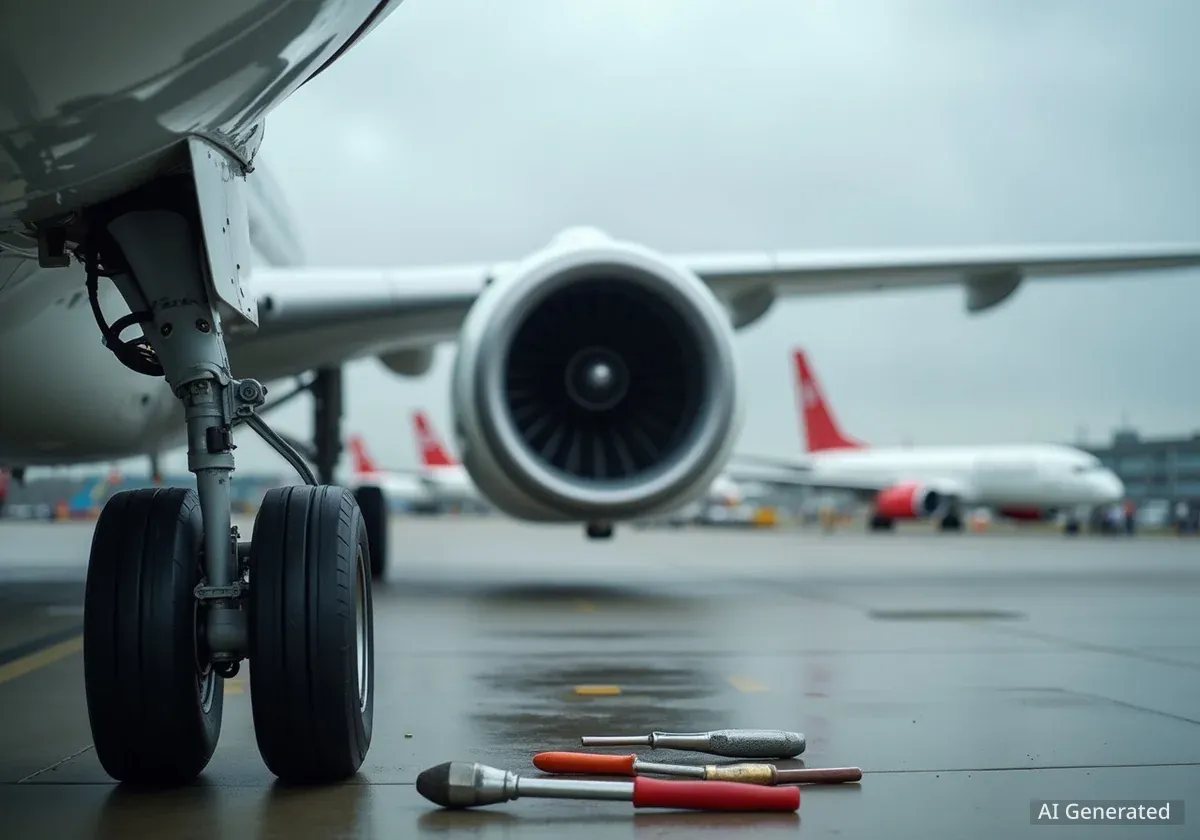Global airlines are projected to incur over $11 billion in additional expenses this year due to ongoing supply chain disruptions. This significant financial burden has been detailed in a new report by the International Air Transport Association (IATA), developed in collaboration with consultants Oliver Wyman. The findings are expected to reignite discussions about competition within the aerospace industry, valued at $250 billion annually.
The report marks the first comprehensive effort to quantify the financial impact of a five-year crisis affecting aerospace supply chains. These disruptions have led to increased airfares for passengers and a rise in flight cancellations across the industry.
Key Takeaways
- Airlines face over $11 billion in extra costs from supply chain issues in 2025.
- The largest cost is $4.2 billion for extra fuel due to older aircraft remaining in service.
- Maintenance and engine leasing add $3.1 billion and $2.6 billion respectively.
- IATA suggests reviewing competition practices among suppliers.
- Supply chain challenges are expected to persist through the decade.
Quantifying the Supply Chain Impact
IATA Director General Willie Walsh expressed surprise at the scale of the report's findings. He indicated that the magnitude of these extra costs might warrant a renewed examination of potential anti-competitive practices by aerospace suppliers. IATA had previously withdrawn a similar complaint in 2018.
"Even if you halve the number, it's still a massive drag on the industry," Walsh stated in an interview. This highlights the severe economic pressure airlines are facing.
Key Cost Breakdown
- Extra Fuel Costs: $4.2 billion (due to older planes in service)
- Additional Maintenance: $3.1 billion
- Engine Leasing: $2.6 billion (to cover maintenance delays)
- Spare Parts Inventory: $1.4 billion (to mitigate delays)
Major Cost Drivers Identified
Researchers pinpointed several areas where supply chain bottlenecks are most impactful. The most significant financial hit comes from $4.2 billion in extra fuel costs. This is because airlines are forced to keep older, less fuel-efficient aircraft in operation longer than planned due to delays in receiving new planes or parts for existing ones.
Another substantial expense is $3.1 billion for additional maintenance. Airlines are incurring these costs as they attempt to keep their aging fleets operational. Furthermore, leasing engines to replace those caught in lengthy maintenance queues adds another $2.6 billion to airline expenditures.
To cope with unpredictable delays, airlines are also spending an estimated $1.4 billion on holding more spare parts in inventory. This strategy aims to create a buffer against unforeseen disruptions but comes with its own significant cost.
Root Causes of Disruptions
The aerospace supply chain has faced numerous setbacks over the past five years. These include significant shortages of labor, essential materials, and specific parts. Repair shops, especially those for critical components like engines, have also experienced mounting delays.
Adding to these challenges, the defense industry is competing for the same manufacturing capacity and resources. Governments worldwide are increasing military spending, which further strains the limited supply available to commercial aviation.
Competition Concerns and Future Outlook
Willie Walsh emphasized that competition for limited supplies will continue. He predicted that supply chain issues would remain a challenge for the rest of the decade. This long-term outlook suggests that the current problems are not temporary.
"There's now going to be continuing competition for the limited supply that is there," Walsh said, adding that supply chains would be an issue for the rest of the decade.
Walsh also questioned the influence that suppliers hold over parts pricing. He called for "additional competition in the aftermarket," noting that this sector has seen considerable consolidation in recent years. This consolidation could be contributing to higher costs for airlines.
Previous Anti-Competitive Actions
IATA has previously advocated for greater competition in the aircraft maintenance sector. This includes pushing for better access to independent parts, often referred to as Parts Manufacturer Approval (PMA) parts.
In 2016, IATA filed a complaint with the European Union against CFM International, a joint venture between GE and Safran. However, this complaint was withdrawn two years later after CFM International committed to maintaining an open and competitive market. A similar agreement was reached with Rolls-Royce in 2021.
Currently, IATA has no immediate plans to launch new legal challenges, but Walsh did not rule out the possibility. He explained that evaluating such actions is complex, involving confidential agreements and extensive legal work.
"We have been evaluating it, but we'd have to do a lot more work," Walsh noted. He added that digging deeper involves teams of lawyers due to confidential airline agreements. "It's a complex piece of work, but I think there could be merit in us looking at that again."
Profit Margins and Industry Disparity
Walsh highlighted a significant disparity between the profit margins of airlines and those of some engine manufacturers and suppliers. Airlines are forecast to have operating margins of 6.7% this year. In contrast, some engine makers and suppliers report margins in the mid-20s.
"How is it that they can make such massive margins from an industry that makes margins that are wafer-thin? It just doesn't add up," Walsh commented. This gap raises concerns about fairness in pricing and market power.
Engine makers, however, argue that their returns are justified. They point to the substantial risks involved in developing new technologies and the cost of offering insurance-style contracts to cover repair expenses. These contracts help airlines manage unpredictable maintenance costs.
IATA projects that airlines will spend approximately $120 billion on repair and maintenance services this year. This figure is expected to increase to $150 billion by 2030, underscoring the growing financial commitment to keeping aircraft operational.
In a slight shift of tone, Walsh acknowledged that Airbus and Boeing have shown improved transparency regarding jet delivery delays. This comes after he had previously criticized planemakers in June for "failing badly" on their commitments.





